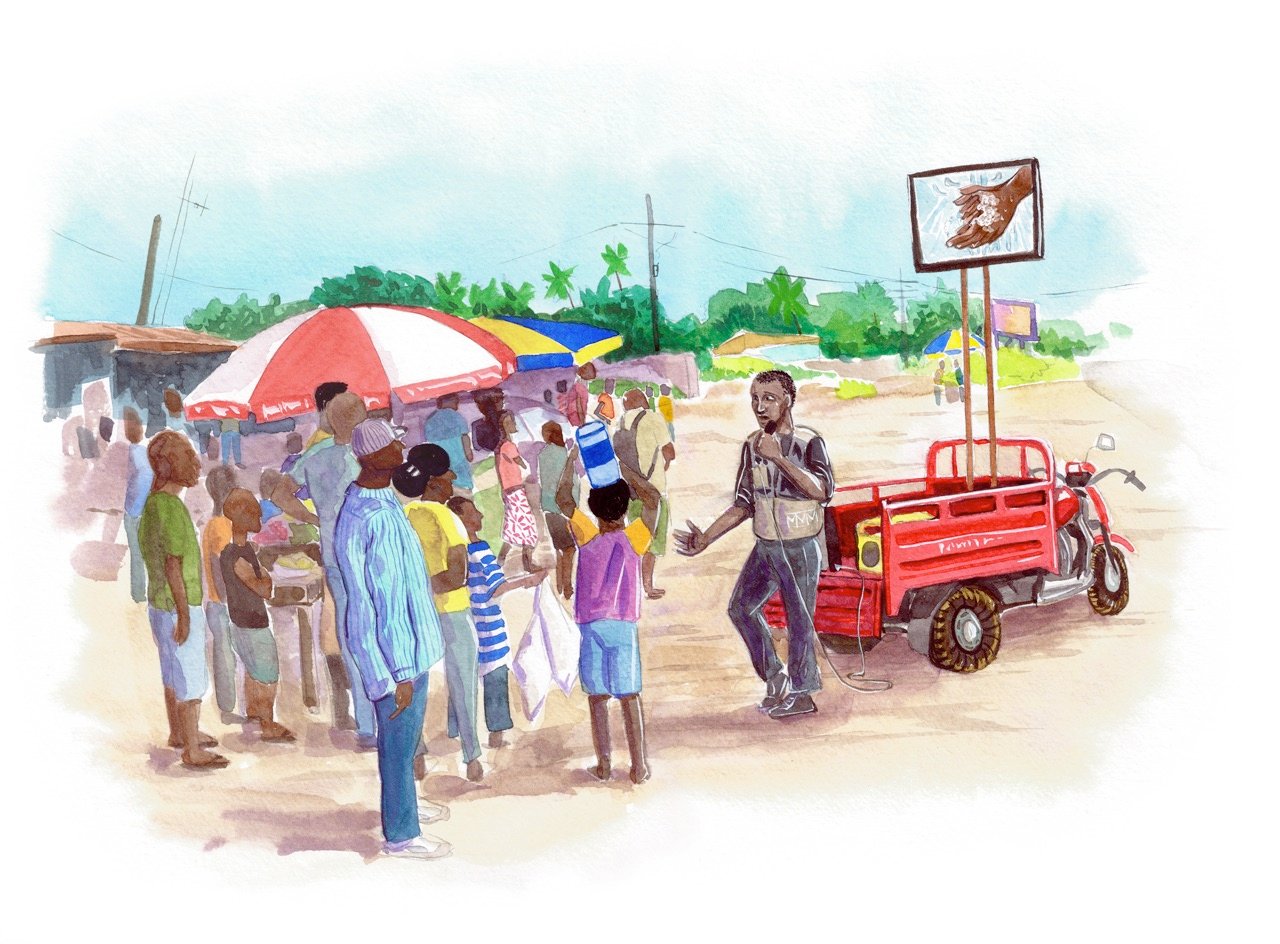NEWS
March 10, 2015

IN BRIEF
By: Divine Anderson, as told to Julia Belluz. This article was originally published by Vox. Divine Anderson runs Liberia’s first and only film school, the Liberia Film Institute. The 37-year-old started making movies in 1996 and has stuck to the medium because he thinks it’s the best way to reach his fellow Liberians, many of whom can’t read. When the Ebola outbreak was peaking last fall, he turned his attention to creating public-health awareness films that he spread through a mobile cinema — essentially a motorcycle retrofitted with a cart that carried him, his students, and a TV. We talked [...]
SHARE
By: Divine Anderson, as told to Julia Belluz. This article was originally published by Vox.
Divine Anderson runs Liberia’s first and only film school, the Liberia Film Institute. The 37-year-old started making movies in 1996 and has stuck to the medium because he thinks it’s the best way to reach his fellow Liberians, many of whom can’t read. When the Ebola outbreak was peaking last fall, he turned his attention to creating public-health awareness films that he spread through a mobile cinema — essentially a motorcycle retrofitted with a cart that carried him, his students, and a TV. We talked to Anderson in March — just before what appeared to be Liberia’s last Ebola patient was released from the hospital — about how these films saved lives.
I teach students how to make low-budget or no-budget movies. You just make do with what you have. You use your smartphone. You make sure you don’t use professionals, because you have to pay them. You look to your friends for help.
We started doing the Ebola films because it was a way for students to learn how to engage their community with films. Only 60 percent of the population can read and write.
Ebola was frightening. It was the unseen enemy. Eventually the government shut down the schools, so our film school was also shut down.
By November, there was a drop in the death rate. We now understood Ebola properly. It was not as deadly as the media made us believe. Ebola is simple. Obey the rules, and you don’t get infected. We took all the precautions —wash hands, use sanitizers — and we were fine. People were still moving around, going to the market, entering public transportation, and nothing happened to them. So in October and November, we called a couple of the students we knew very well and invited them over.
The fear of Ebola probably killed more people than the virus
Together we made educational films about Ebola, to engage the community. Our health messages were based on the rules the Centers for Disease Control came up with, some basic rules for the “Ebola Must Go” campaign. There were five key public-health messages: Don’t touch the sick, don’t touch the dead, don’t shake hands, report sick persons, and contact tracing (when health officials seek out all the people who have potentially been exposed to the virus and quarantine them if they become sick).
We saw it as our responsibility to create a film that would carry those five key messages, that would help the people who cannot read and write to understand Ebola. That’s exactly what we did. We also had a Christmas film about keeping families home during the season.
We retrofitted three motorcycles to travel around and show the films. We would leave at 6 in morning and just keep going from street to street to show people the films. We did it 10 hours a day for several weeks, all over Monrovia. At the end of the day, we would spend one hour collecting reports and feedback from people. Then we would go to bed. The next morning, we would take off again.
More than 50,000 people saw these movies. Monrovia alone has more than 900,000 people, and it gets more crowded during the Christmas season, which is when we screened these movies street to street, market to market, and in the most crowded places.
We had mixed reactions at different points and from different communities. To some, it was was timely and educating. Some were happy. Some asked to know more about Ebola and the Ebola survivors’ stigma. Some people thought we were sponsored by government and didn’t listen to us. When we explained that we are an NGO, they accepted us and listened to us.
People understand Ebola better now. The films we made, this is just a starting point.
When you understand how Ebola works, you will no longer be afraid of it. Fear killed a lot of people, because they didn’t understand what Ebola was. People were afraid of helping even when they could, because they didn’t understand the virus. I lost my sister-in-law. She was three months pregnant. She had low blood pressure, and for three days we were trying to get her medical assistance. Her own hospital couldn’t admit her, and she eventually died. Because of the fear of Ebola. The fear of Ebola probably killed more people than the virus.
Now Ebola is going but not gone. People are no longer afraid of Ebola. People understand it better. The films we made, this is just a starting point. I would love to do more.
